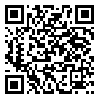BibTeX | RIS | EndNote | Medlars | ProCite | Reference Manager | RefWorks
Send citation to:
URL: http://etiadpajohi.ir/article-1-3262-en.html
Objective: The present study aimed to model the mediating role of self-efficacy beliefs in the relationship between cognitive emotion regulation and cognitive flexibility with resilience in adolescents with addiction propensity. Method: This was a descriptive-correlational study using structural equation modeling (SEM) for analysis. The statistical population included all second-grade high school adolescents with addiction propensity in Ardabil during the 2024-2025 academic year. From this population, 300 individuals were selected using a cluster random sampling method. Data was collected using the resilience scale, the cognitive emotion regulation questionnaire, the cognitive flexibility inventory, and the general self-efficacy scale. The collected data was then analyzed using SEM. Results: The results showed that both cognitive emotion regulation and cognitive flexibility had a significant direct effect on resilience. In addition, the indirect relationship of cognitive emotion regulation and cognitive flexibility with resilience was significantly mediated by self-efficacy. Conclusion: The findings provide a basis for designing psychological interventions aimed at strengthening cognitive emotion regulation, cognitive flexibility, and self-efficacy to enhance resilience in adolescents with addiction propensity.
Received: 2025/02/6 | Accepted: 2025/09/1 | Published: 2025/10/30
| Rights and permissions | |
 |
This work is licensed under a Creative Commons Attribution-NonCommercial 4.0 International License. |






